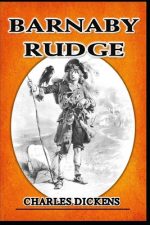Cocktail Talk: Barnaby Rudge Part I

I’ve had a goodly amount of Charles Dickens Cocktail Talk posts here on the Spiked Punch blog (started in the 1800s in honor of Dickens naturally), but never one from the underrated and underread book Barnaby Rudge, a situation which I’m going to remedy over the next few weeks, as I’ve recently re-read it, and so am primed for Cocktail Talks from it. You can learn more about the book from scholars more learned than I, but I will give you this: it has one of the finest, or most well-imagined, fictional pubs ever, The Maypole, in which some of the action centers. Also, it’s a book (like so much of Dickens) that while taking place in the past is finely attuned to the present, in this case as the sort-of second part of the book takes place around the actual London anti-Catholic (in theory, at least) riots, driven by Lord George Gordon, and the “politics” and demagoguery and players around such mirror a lot of what we see today. Sad, in a way. But the Maypole is nice! Until the . . . well, I won’t give too much more away. But I will start out at the Maypole, when one of the book’s main characters (out of a full and varied cast, as Dickens does), locksmith Gabriel Vaden, arrives at the pub on a stormy night.
When he got to the Maypole, however, and Joe, responding to his well-known hail, came running out to the horse’s head, leaving the door open behind him, and disclosing a delicious perspective of warmth and brightness – when the ruddy gleam of the fire, streaming through the old red curtains of the common room, seemed to bring with it, as part of itself, a pleasant hum of voices, and a fragrant odour of steaming grog and rare tobacco, all steeped as it were in the cheerful glow – when the shadows, flitting across the curtain, showed that those inside had risen from their snug seats, and were making room in the snuggest corner (how well he knew that corner!) for the honest locksmith, and a broad glare, suddenly streaming up, bespoke the goodness of the crackling log from which a brilliant train of sparks was doubtless at that moment whirling up the chimney in honour of his coming – when, superadded to these enticements, there stole upon him from the distant kitchen a gentle sound of frying, with a musical clatter of plates and dishes, and a savoury smell that made even the boisterous wind a perfume – Gabriel felt his firmness oozing rapidly away. He tried to look stoically at the tavern, but his features would relax into a look of fondness. He turned his head the other way, and the cold black country seemed to frown him off, and drive him for a refuge into its hospitable arms.
‘The merciful man, Joe,’ said the locksmith, ‘is merciful to his beast. I’ll get out for a little while.’
And how natural it was to get out! And how unnatural it seemed for a sober man to be plodding wearily along through miry roads, encountering the rude buffets of the wind and pelting of the rain, when there was a clean floor covered with crisp white sand, a well swept hearth, a blazing fire, a table decorated with white cloth, bright pewter flagons, and other tempting preparations for a well-cooked meal – when there were these things, and company disposed to make the most of them, all ready to his hand, and entreating him to enjoyment!
–Charles Dickens, Barnaby Rudge





















